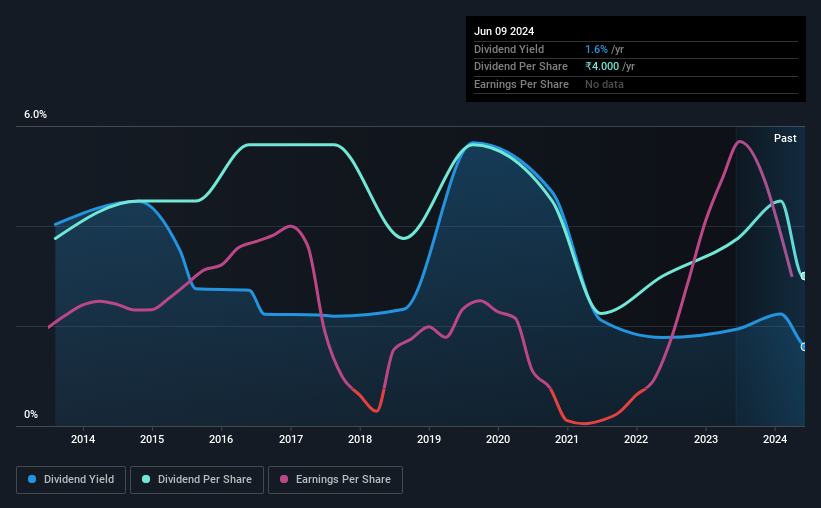- India
- /
- Paper and Forestry Products
- /
- NSEI:TNPL
Tamil Nadu Newsprint and Papers' (NSE:TNPL) Shareholders Will Receive A Smaller Dividend Than Last Year
Tamil Nadu Newsprint and Papers Limited's (NSE:TNPL) dividend is being reduced from last year's payment covering the same period to ₹1.00 on the 27th of October. However, the dividend yield of 1.6% is still a decent boost to shareholder returns.
See our latest analysis for Tamil Nadu Newsprint and Papers
Tamil Nadu Newsprint and Papers' Earnings Easily Cover The Distributions
A big dividend yield for a few years doesn't mean much if it can't be sustained. Before making this announcement, Tamil Nadu Newsprint and Papers was easily earning enough to cover the dividend. This means that most of what the business earns is being used to help it grow.
Over the next year, EPS could expand by 17.1% if recent trends continue. If the dividend continues on this path, the payout ratio could be 11% by next year, which we think can be pretty sustainable going forward.

Dividend Volatility
The company has a long dividend track record, but it doesn't look great with cuts in the past. The annual payment during the last 10 years was ₹5.00 in 2014, and the most recent fiscal year payment was ₹4.00. Doing the maths, this is a decline of about 2.2% per year. Generally, we don't like to see a dividend that has been declining over time as this can degrade shareholders' returns and indicate that the company may be running into problems.
The Dividend Looks Likely To Grow
With a relatively unstable dividend, it's even more important to evaluate if earnings per share is growing, which could point to a growing dividend in the future. Tamil Nadu Newsprint and Papers has impressed us by growing EPS at 17% per year over the past five years. A low payout ratio and decent growth suggests that the company is reinvesting well, and it also has plenty of room to increase the dividend over time.
Tamil Nadu Newsprint and Papers Looks Like A Great Dividend Stock
Overall, we think that Tamil Nadu Newsprint and Papers could be a great option for a dividend investment, although we would have preferred if the dividend wasn't cut this year. By reducing the dividend, pressure will be taken off the balance sheet, which could help the dividend to be consistent in the future. All in all, this checks a lot of the boxes we look for when choosing an income stock.
Investors generally tend to favour companies with a consistent, stable dividend policy as opposed to those operating an irregular one. Meanwhile, despite the importance of dividend payments, they are not the only factors our readers should know when assessing a company. Case in point: We've spotted 3 warning signs for Tamil Nadu Newsprint and Papers (of which 1 is a bit concerning!) you should know about. Is Tamil Nadu Newsprint and Papers not quite the opportunity you were looking for? Why not check out our selection of top dividend stocks.
Valuation is complex, but we're here to simplify it.
Discover if Tamil Nadu Newsprint and Papers might be undervalued or overvalued with our detailed analysis, featuring fair value estimates, potential risks, dividends, insider trades, and its financial condition.
Access Free AnalysisHave feedback on this article? Concerned about the content? Get in touch with us directly. Alternatively, email editorial-team (at) simplywallst.com.
This article by Simply Wall St is general in nature. We provide commentary based on historical data and analyst forecasts only using an unbiased methodology and our articles are not intended to be financial advice. It does not constitute a recommendation to buy or sell any stock, and does not take account of your objectives, or your financial situation. We aim to bring you long-term focused analysis driven by fundamental data. Note that our analysis may not factor in the latest price-sensitive company announcements or qualitative material. Simply Wall St has no position in any stocks mentioned.
About NSEI:TNPL
Tamil Nadu Newsprint and Papers
Manufactures and markets paper and paperboards in India and internationally.
Good value with mediocre balance sheet.
Similar Companies
Market Insights
Community Narratives



